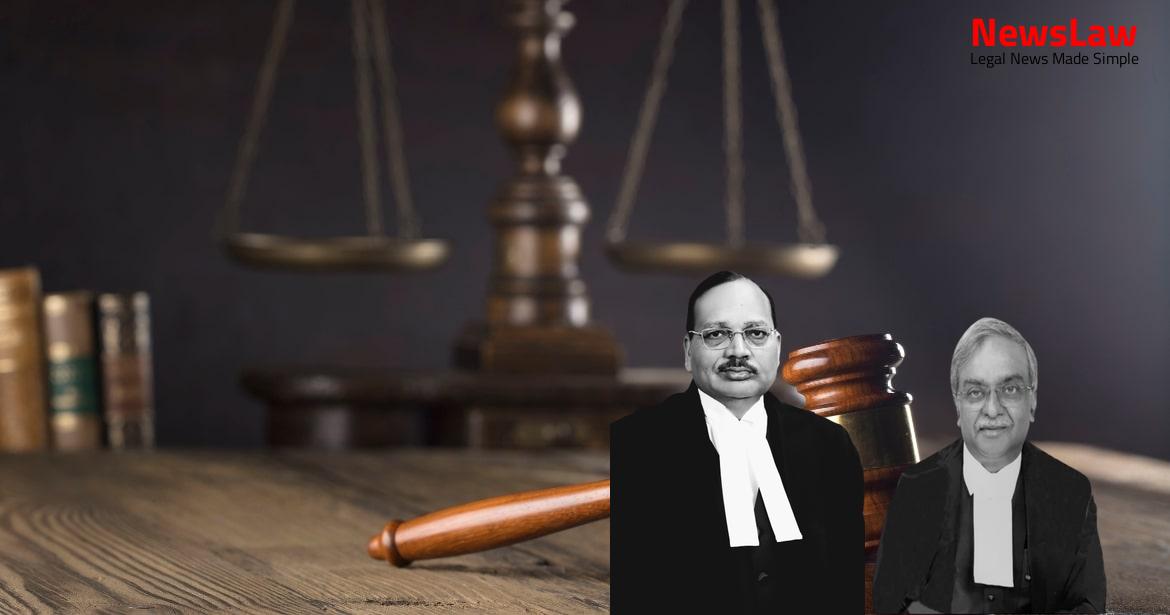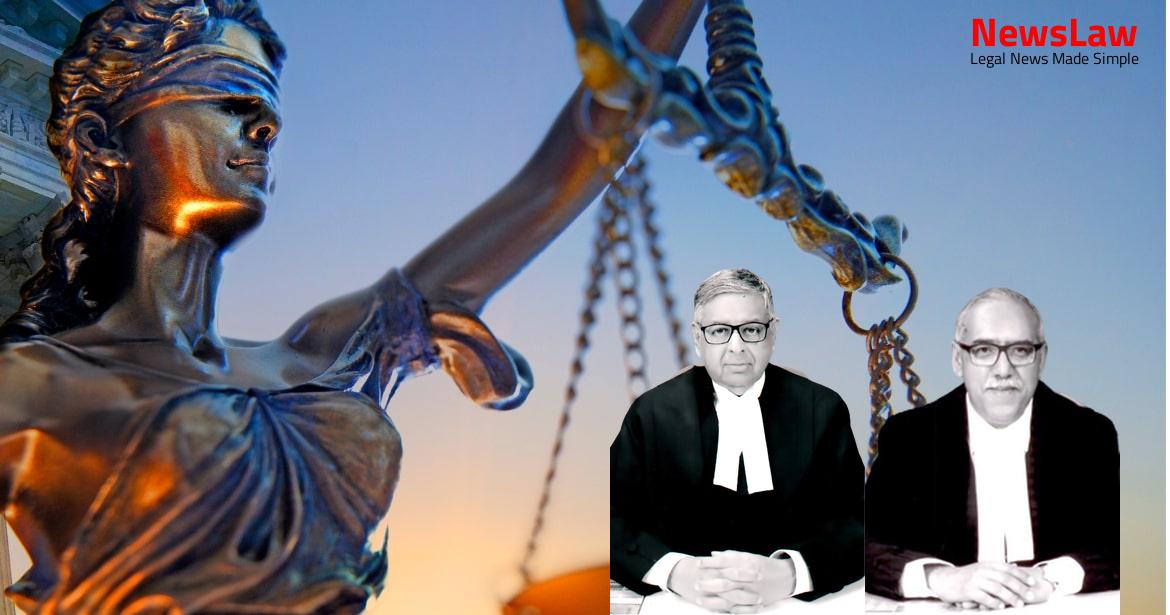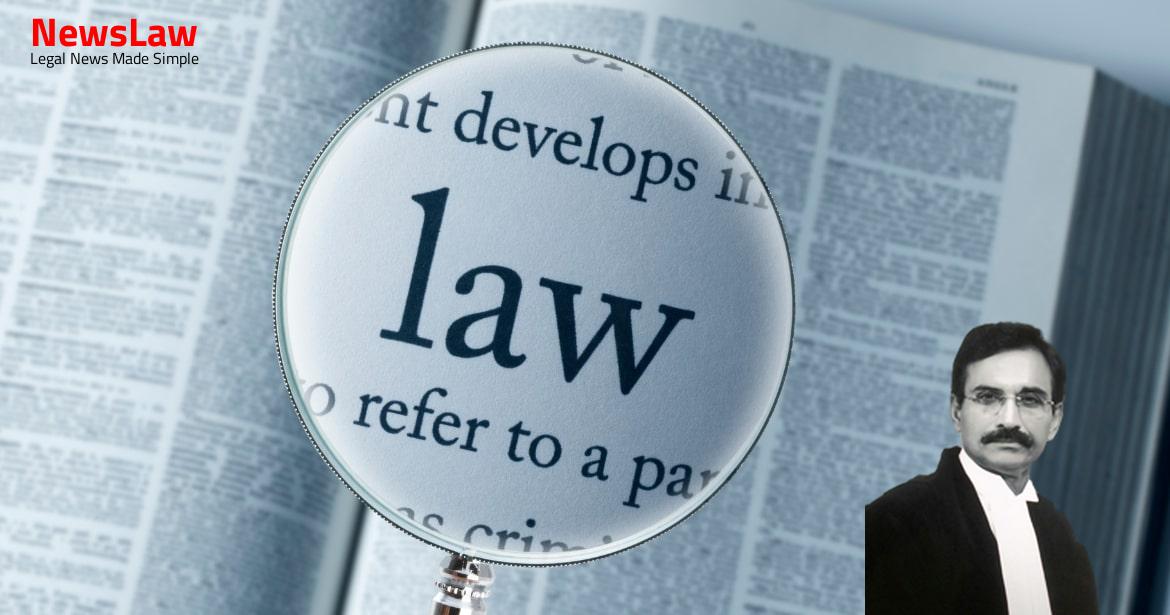Explore the critical legal analysis by the Division Bench on challenging seniority lists in a recent court ruling. The court emphasized the fundamental right to be considered for promotion, highlighting key principles regarding delay in approaching the adjudicatory forum. Discover the significance of adherence to statutory rules in determining seniority, ensuring fairness in promotion processes. #JudicialReview
Facts
- The Division Bench allowed the appeal and dismissed the writ petition.
- The original writ petitioners were criticized for a delay in approaching the court to challenge the seniority list of 2006.
- The claim of the original writ petitioners was deemed barred by principle of acquiescence for not challenging the final seniority list dated 05.09.2006.
- No delay or laches were found in the present case.
- A serious challenge to the determination of seniority based on the preparation of the seniority list ‘de hors’ the rules was noted.
- The Competent Authority and the State were found to have erred in determining seniority based only on the date of receipt of the three select lists from the same selection process.
- The department took a fresh exercise of preparing the seniority list in 2009 due to the framing of new rules for Junior Engineers of the Minor Irrigation Department.
- The appellants made representations to correct the seniority list based on the marks obtained in their examinations, challenging the order of receipt of the select list of the three streams.
- The delay of three to four years in a seniority dispute matter was not considered fatal by the court.
- A provisional seniority list was published in 2009 inviting objections, followed by a final seniority list published on 05.03.2010.
- The High Court quashed the seniority lists of 2006 and 2010, directing the department to draw a fresh seniority list according to specified rules.
- The preparation of the seniority list being prejudicial to civil and mechanical engineers was deemed to affect promotions and departmental work.
- The Single Judge allowed the writ petition, while the Division Bench dismissed it, leading to the present appeals.
Also Read: Analysis of Jurisdiction under Section 319 of the CrPC
Arguments
- In the case of Tridip Kumar Dingal and others vs State of West Bengal and others, it was held that non-joinder of necessary parties was an issue as none of the 66 candidates against whom the complaint was made were made parties.
- The case of K.R. Mudgal established that a seniority list unchallenged for 3 to 4 years should not be disturbed.
- 3-4 years is considered a reasonable period for challenging seniority, and if someone challenges it beyond this period, they must provide a satisfactory explanation for the delay and laches in approaching the adjudicatory forum.
- The Division Bench relied on various judgments including Dayaram Asanand Gursahani vs. State of Maharashtra, B.S. Bajwa vs State of Punjab, Malcom Lawrence Cecil D’Souza vs Union of India, and R.S. Makashi vs I.M. Menon to reject the appellants’ claim based on delay.
- Dr. B.S. Chauhan, J. discussed numerous cases and Constitution Bench judgments, concluding that a seniority list existing unchallenged for more than three to four years should not be disturbed.
- Any challenge to seniority beyond this period requires an explanation for the delay and laches in approaching the adjudicatory forum, as stated in Shiba Shankar Mohapatra vs State of Orissa judgment.
Also Read: Interpretation of Section 34 IPC in Conviction and Sentencing
Analysis
- Appellants challenged the seniority list in 2010 upon discovering that it was prepared contrary to statutory rules.
- The Appointing Authority failed to prepare a combined seniority list as required under the 1991 Seniority Rules.
- The final seniority list was published on 05.09.2006, mentioning three separate lists received on different dates.
- The challenge was solely on the preparation of the seniority list, not the selection process itself.
- The Division Bench ruled that the delay in challenging the seniority list was within a reasonable period.
- The rules stipulated one list for one selection, violating them by creating three separate lists for one selection.
- The Commission forwarded three separate lists for Agriculture, Mechanical, and Civil streams on different dates.
- The seniority list was finalized based on the sequence of receiving the select lists, not on combined merit as required by the Rules.
- The appointing authority’s error in preparing the seniority list was noted and deemed contrary to the statutory provisions.
- Quota of promotees and direct recruits in a 1:1 proportion results in a specific seniority order.
- If the quota is in a 1:3 proportion, a different seniority order is to be followed.
- Excess appointments beyond prescribed quota are pushed down for seniority, while unfilled vacancies do not grant seniority of earlier years.
- Seniority list to be prepared by the appointing authority after inviting objections and finalizing after disposal of objections.
- Seniority determined based on the date of substantive appointments with specific provisions for direct recruits and promotees.
- Cyclic order for determining seniority of promotees and direct recruits if both are appointed in the same selection process.
- The right to be considered for promotion is considered a fundamental right under Article 14 and Article 16 of the Constitution of India.
- In the case of Dayaram Asanand Gursahani, there was a delay of 9 years, which led to a violation of the fundamental right to be considered for promotion.
- The Ajit Singh vs State of Punjab case emphasized Article 14 and Article 16(1) of the Constitution of India, stating that failure to consider an eligible candidate for promotion is a violation of their fundamental right.
- The judgment in Prabodh Verma vs State of Uttar Pradesh established that a challenge to a seniority list must be made within three to four years, beyond which it would require justification.
- The court has consistently emphasized the fundamental right to be considered for promotion, as seen in various cases like Director, Lift Irrigation Corporation Ltd. vs Pravat Kiran Mohanty and others.
- In the case of Mukul Kumar Tyagi vs The State of Uttar Pradesh, it was highlighted that impleading every candidate is not necessary when there is a long list of candidates, as some can represent the interests of others.
- Cases like B.S. Bajwa, Malcom Lawrence Cecil D’Souza, and R.S. Makashi have shown delays ranging from 8 to 15 years, emphasizing the importance of timely legal actions in matters of promotion challenges.
- Division Bench of the High Court relied on judgments where affected parties were not impleaded
- In the case of Ranjan Kumar and Others vs State of Bihar and Others, affected parties were not impleaded
- In the case of Indu Shekhar Singh and others vs State of U.P. and others, affected parties were not impleaded
- In the case of State of Uttaranchal vs Madan Mohan Joshi and others, affected parties were not impleaded
- The seniority list of 2010 could be revisited and prepared afresh even if the 2006 seniority list was not challenged.
- The reasoning regarding the issue of single selection is not sustainable based on Rules 1991 and 2009.
- Seniority of direct recruits to one selection must be in one combined list based on performance and marks awarded in the examination.
- The judgment of the Division Bench regarding Rule 5 and 8 of 1991 Rules was erroneous.
- The single judge’s direction for preparation of a fresh seniority list in accordance with Rules 1991, whether Rule 5 or Rule 8, was upheld.
- There is no conflict between direct recruits and promotees in the seniority list preparation process.
Also Read: Interpretation of Rules and Equitable Relief in Recruitment Case
Decision
- The impugned judgment of the Division Bench of the High Court dated 04.12.2019 is set aside.
- The judgment of the Single Judge dated 14.05.2019 is maintained.
- No order as to costs shall be passed.
- Pending application(s), if any, is/are also disposed of accordingly.
Case Title: AJAY KUMAR SHUKLA Vs. ARVIND RAI (2021 INSC 840)
Case Number: C.A. No.-005966-005966 / 2021



